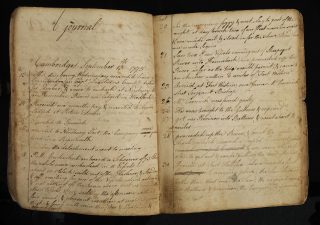 Firsthand accounts of the Revolutionary War experiences of enlisted men are rare. One of the few, often-cited examples is the journal of a Massachusetts soldier, James Melvin, documenting his march with Gen. Benedict Arnold to Quebec in 1775, and his subsequent imprisonment in Canada. The text of Melvin’s Revolutionary War journal has been available to historians from three limited editions published in 1857, 1864 and 1902, but the actual document has been listed as “unlocated” in subsequent scholarly works. The long-lost original manuscript was found and identified by a London bookseller, and the Institute had the good fortune to acquire it for the Robert Charles Lawrence Fergusson Collection in July 2018.
Firsthand accounts of the Revolutionary War experiences of enlisted men are rare. One of the few, often-cited examples is the journal of a Massachusetts soldier, James Melvin, documenting his march with Gen. Benedict Arnold to Quebec in 1775, and his subsequent imprisonment in Canada. The text of Melvin’s Revolutionary War journal has been available to historians from three limited editions published in 1857, 1864 and 1902, but the actual document has been listed as “unlocated” in subsequent scholarly works. The long-lost original manuscript was found and identified by a London bookseller, and the Institute had the good fortune to acquire it for the Robert Charles Lawrence Fergusson Collection in July 2018.
Little is known about the background of James Melvin, but the carefully written manuscript reveals him to be a man of some learning. He was in his early twenties when he enlisted in Capt. Henry Dearborn’s company and joined General Arnold’s expedition to Quebec. His Revolutionary War journal begins on September 13, 1775, the day his company marched north from Cambridge. He recorded a nearly daily account of the arduous trek through the Maine wilderness to Quebec, where in the early hours of Sunday, December 31, his company was attacked by the enemy during a violent snowstorm. Melvin was among the survivors who were taken prisoner by the British, and nearly two-thirds of his journal is devoted to his seven months of captivity with his comrades-in-arms. His last entry is dated August 5, 1776, the day of their release in a prisoner exchange.
The manuscript volume contains two essays by Melvin that were not included in the published editions of his journal. One, titled “Treatise upon Air,” draws from the work of Sir Isaac Newton as well as the Bible. The other essay, “An Explanation of Scripture Taken from the Epistle of St. Paul the Apostle to the Gallations,” invokes the struggle for American independence: “Stand fast in the liberty wherewith Christ hath made us free; and be not Intangled again with the Yoke of bondage.” The Institute has had the manuscript volume conserved and digitized, and the full contents of Melvin’s original work are now widely available to scholars for the first time.
View the Full Journal